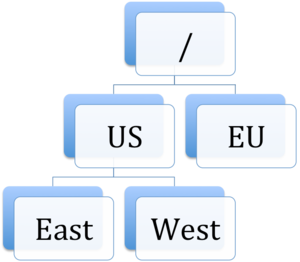(→Topology) |
|||
| Line 7: | Line 7: | ||
===Topology=== | ===Topology=== | ||
| − | The topology of a GWS Cluster can be considered as a standard directory tree where a leaf node is a GWS data center. The following diagram shows a GWS Cluster with 2 geographical regions (US and EU), and 3 GWS datacenters (East and West in the US region, and EU as its own | + | The topology of a GWS Cluster can be considered as a standard directory tree where a leaf node is a GWS data center. The following diagram shows a GWS Cluster with 2 geographical regions (US and EU), and 3 GWS datacenters (East and West in the US region, and EU as its own datacenter). |
| − | |||
| + | [[File:gws_multidatacenters-topo_851.png|thumb|left]] | ||
{{Chgbar_close}} | {{Chgbar_close}} | ||
Revision as of 14:27, July 6, 2017
Multiple Datacenter Deployment
Starting in release 8.5.1, GWS supports a deployment with multiple (two or more) datacenters. This section describes a this type of deployment.
Overview
A multiple datacenter deployment implies a logical partitioning of all GWS nodes into segregated groups that are using dedicated service resources, such as T-Server, StatServers, and so on.
Topology
The topology of a GWS Cluster can be considered as a standard directory tree where a leaf node is a GWS data center. The following diagram shows a GWS Cluster with 2 geographical regions (US and EU), and 3 GWS datacenters (East and West in the US region, and EU as its own datacenter).
Comments or questions about this documentation? Contact us for support!

